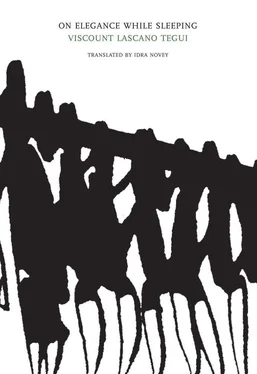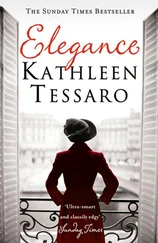APRIL 10, 18—
Living in our needle hole of the Seine valley, near the river, by its endless flow, where the wind often pulls trees up by their roots and the sun roasts the fishermen’s skin; by that road unencumbered by any city, along those routes where tramps still chew over their songs of revolution, I’ve never felt the guiding hand of authority, nor the least hint of a hierarchy controlling my life. My solitude has never had any confidant save my own instincts. Today, however, having joined the rest of the world in that courtyard outside the army fort, I’ve suffered in a way none of my comrades can comprehend. They just complain about the discipline — and they have no trouble finding the words to complain. I can’t find the words. I swallow my pain. There is only one way I can think of to sublimate this experience. Vengeance. Together with my friend here, who speaks in a low, earnest voice, I’d like to scream out my horror at the way men destroy all the beauty in the world by killing children.
I sing my childhood in these pages that no one will ever read since they are written only for me. Nobody ever gave me toys to sap away my manhood, to teach me to be docile and, sadder still, simply ordinary. No. I’ve never had the tinplate and cardboard gendarmes children play with in the city. Justice is a painted gendarme whose colors rub off in our hands. A gendarme that’s been painted, carved, encrusted in the foods we ingest. The trademark of our moribund society, of a nation unhinged, of men who don’t know how to hold on to the elegance they possessed as children, when man —that obese monster — happily slept.
APRIL 24, 18—
Iwas a good geometry student. I loved straight lines. Perpendicular ones above all. These are lifelines, I told myself.
I never stopped to look at the lithograph of the Tower of Pisa that hung in our foyer. Its leaning troubled me. I could see it falling. In the paper each day, I looked for news from Italy first. No, it still hadn’t fallen.
But when? My nightmares took full advantage of my concern. The Tower of Pisa eroded spectacularly in my dreams.
I always enjoyed news of such disasters. Were there a lot of fatalities? Oh, not that it really mattered how many citizens were crushed under some wall — what are a few deaths compared to the moral serenity its collapse provided to people like myself, who couldn’t bear not knowing when it would finally come down? Certainly old neighborhoods have their particular poetry, patina, the imprint of time; but I stay away from neighborhoods where the buildings all lean up against each other at the elbow like old women in nursing homes trying not to topple over. It’s not the walls themselves that bother me so much as the stanchions propping them up. They never seem strong enough. Props that aren’t absolutely straight give me goose bumps. My hair stands on end. The same thing happens when I see crooked pictures, and it’s even worse when it’s a landscape painting making use of perspective — a terrible fad I can’t forgive bad painters for indulging. This must explain my excessive love for stereoscopes: a perfectly placed line sweetens my soul. In the Bougival cemetery there was once a truncated pyramid that obstructed my view of the main street. I tipped the monument over. Someone righted it and put even more supports around the thing, but I destroyed it again, repeatedly, until the owners of the plot came to realize the gravity of the aesthetic assault they’d perpetrated upon nature and reduced the height of the tomb. I don’t know if they also shortened the corpse.
Proportion — the source of all beauty in architecture — was nearly the end of me. Bougival is an attractive town, I suppose, in the context of eighteenth-century architecture, but there’s a triumphal arch that the Romans left in Zaghouan which is so stunning that every woman who passes in front of it acquires a beauty frankly terrifying in its perfection. I felt ill before this triumphal arch. They arrested me for desertion, and that arrest was my salvation. Otherwise, I would’ve died like a voluptuous Buddha there on the roadside, contemplating the poetry that the perfect proportions of those architectural lines showered down upon the women of our day and age — just as it endowed the local women with a similar charm two millennia earlier, those same African women who made a temple out of love, in which they lay themselves down to pray.
Love is the most profound aesthetic experience in a person’s life. Faith cannot compete. It and love tend to go their separate ways — though they do often stage reunions on battlefields, taking refuge together, as when they were first born, in men stricken with fear, nothing more than the terrified playthings of God.
MAY 6, 18—
Once, men possessed the sea, the mountains, and the stars. They put them to use in their poetry, in their dreams and deaths. Today, however…
One can see, sometimes, at a distance, along the basin of the Seine, an imprecise something that, given its lovely surroundings, must, one assumes, be a child or a beautiful woman. As one gets closer to the something, though, one finds instead what should be a rather appealing human being is in fact nothing more than a small dog, a camera, or a bicycle.
MAY 8, 18—
The coal merchant’s son, Joaquín, had inherited a cuirass — by way of the continual, chaotic game of blackmail and allegiance played by maids and porters. This cuirass wasn’t ancient, but rather Republican in origin. As Joaquín kept watch over his father’s coal, he entertained himself by adjusting this body armor. Imagine the darkness of the coal pit, and that dirty-faced child encased beneath a breastplate of steel — it’s nothing less than the evocation of a vanished era. No historian could have conceived of a more perfect scene, entirely of a piece: Joaquín, beneath his mesh and plating, as an antique warrior, a statue of Mars hidden beneath the earth, awaiting the shovel that would bring him to light.
As Joaquín couldn’t hide his contentment at feeling himself prisoner in his steel corselet, I became quite jealous, wanting to feel the embrace of something similar…I couldn’t buy a cuirass, no matter how I dreamed of one. So I bought a stiff corset the color of sailcloth instead, and learned then the secret delectation women must feel as they are silently, constantly, shaped.
I’d discovered the sheath of voluptuousness. The Shulamith lying upon Solomon would have no other objective: my corset put pressure upon those same nerve clusters that gave me so much pleasure when alone…
MAY 19, 18—
Mention of Joaquín has brought me to my childhood again. Is this the so-called “blue hour”? Who named it that? There is always a certain sarcasm in people who live within the limits of the law, but were once little delinquents…
A man approached me one day on my way home from school. I was polite as a little girl whose schoolmistress lavishes her with the sort of caresses that would drive an older person wild with delight.
“Do you know where someone could rent a house around here?” he asked.
“There, across the street,” I said.
“Why don’t you go pick up the keys for me so we can take a look?” he asked.
I went to get them and we entered the un-rented house. The doors to all the rooms were open and our footsteps made their way to the center of the building. At the top of the stairs, the friendly man who’d made me his associate gave me some caramels with one hand and with his other unbuttoned my pants.
“How pretty it is,” he said with the forthright smile of a savage, caressing me.
I heard someone calling to me. A distant voice I hadn’t heard since my mother died. Where did it come from? I moved back down the stairs like an automaton. I went toward the voice. The friendly man followed me, and when I’d gotten farther away, running now, trying to make up for the time I’d lost, I saw him close the door diligently behind me, looking at me much as a poor poet might, peeking into the Ministry of Finance. *
Читать дальше












